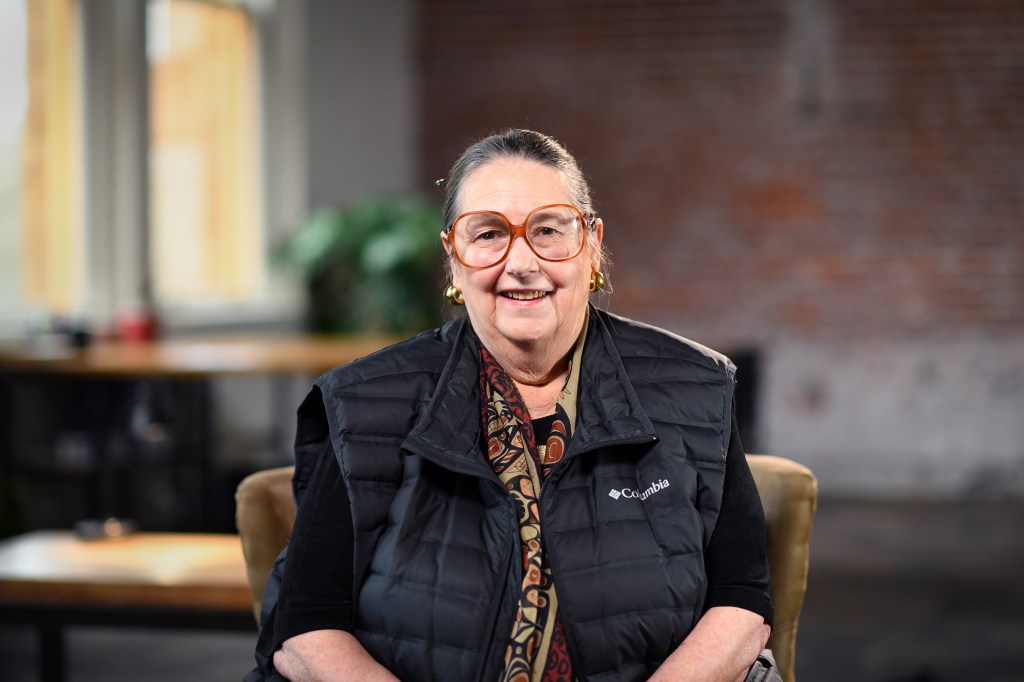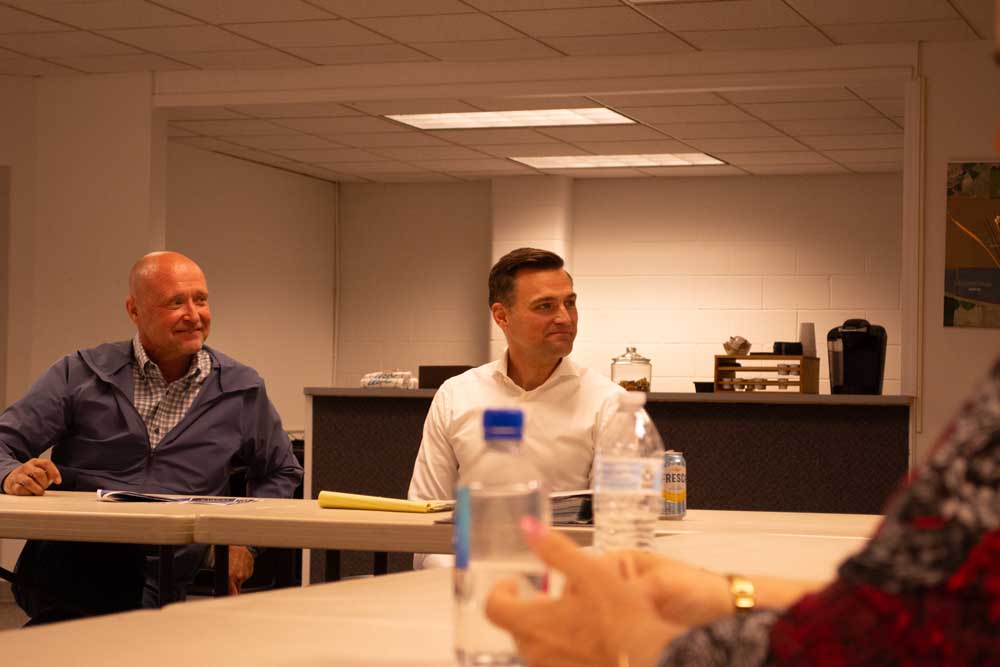Knight’s million is opening gambit in high stakes governor’s race
Published 11:49 am Tuesday, April 5, 2022

- Betsy Johnson
On April Fool’s Day, Nike founder Phil Knight gave $750,000 to a 2022 campaign for governor, but this time the joke is on Republicans and Democrats.
Knight’s contributions to the insurgent campaign of former Sen. Betsy Johnson of Scappoose now total $1 million, seven months before the Nov. 7 general election.
Trending
It’s a clear sign that Knight sees Johnson’s unaffiliated campaign as the best shot at ending Democrats’ 35-year hold on Oregon’s governorship.
It’s a switch from 2018, when Knight gave early and often — and very big — to former Rep. Knute Buehler, R-Bend, who lost the general election to incumbent Kate Brown. His $2.5 million in contributions primed the GOP pump to compete with Democrats in a race that cost nearly $40 million for Brown to win.
The Knight money will require responses from contributors to Democrats and Republicans, especially after the May 17 primary.
Thomas Wheatley, a consultant for the governor’s campaign of former House Speaker Tina Kotek, D-Portland, said Democrats are taking notice of the rising level of spending in the state and will stay competitive.
“Democrats in Oregon and the national party understand the importance of winning the state,” Wheatley said. “Democrats have a strong history of doing what it takes.”
Republican consultant and former state lawmaker Bill Post said Johnson is benefiting for the moment from a lack of opponents — the winners of the primary will define the race.
Trending
“There is no Republican nominee yet or any media attention yet on Betsy Johnson’s extensive record of voting with Tina Kotek,” Post said. “Betsy was a Democrat three years ago when she voted yes on the Corporate Activity Tax.”
Post said despite a long drought in races for Oregon governor, he believes national Republicans know there is opportunity in Oregon this year. Democratic resources are spread thin trying to defend dozens of political hotspots.
“When it comes to the general election, with a strong Republican candidate who stands up for our values, the funding will turn to that candidate,” Post said.
For now, the fundraising gap looks large. Johnson has over $5.1 million in the bank.
Only two candidates among the 34 in the May primary have more than $1 million in the bank from widespread fundraising as of Tuesday: Kotek has $1.15 million, while former House Minority Leader Christine Drazan, R-Canby, has $1.18 million.
Lake Oswego consultant and attorney Bob Tiernan, a Republican, has $1,126,795, which includes $500,000 contributions each from himself and Grants Pass LLC, with which he is affiliated.
Treasurer Tobias Read has raised over $1.3 million in the past two years and has $888,895 on hand.
Johnson will need the money since she won’t have the massive pockets of the two national and state parties to depend on. She needs to run a signature campaign to qualify to submit just under 25,000 valid signatures to the secretary of state by the end of August to secure a spot on the general election ballot.
A likely three-way race between the Democratic and Republican primary winners, along with Johnson, could eclipse the 2018 spending record.
In 2022, the winners of the Democratic and Republican primary will get an infusion of national campaign cash, especially Democrats looking to push their winning streak for governor to almost four decades.
But times have changed since four years ago. The Democratic “Blue Wave” has switched to a Republican “Red Tide.”
This election, Democrats are on the defense. Along with any current political issues, the Democrats are fighting the course of political history.
The party of new presidents usually loses seats in Congress in the first midterm election, an average of about 25 seats.
Democrats are hanging on to majorities in the U.S. Senate and U.S. House by their fingernails. The House majority is down to 221-209 with five vacancies, well within the average midterm margin of loss to give the chamber back to Republicans.
The U.S. Senate has a 50-50 split between Republicans and Democrats. Just as Republicans actually picked up seats in the otherwise disastrous 2018 midterm, the staggered six-year terms of the 100 senators are harder to forecast.
Democrats will need major fundraising to retain seats in Georgia, Arizona, and Nevada. The Center for Politics at the University of Virginia has moved the re-election of veteran U.S. Sen. Patty Murray, D-Washington, from likely Democratic to leaning Democratic. GOP money has been flocking to the likely Republican nominee, Tiffany Smiley, who reported raising over $900,000 in federal financial disclosure forms covering the last three-months.
Republicans have to defend 20 governorships vs. 16 for Democrats.
That will make demands on political money across the nation. While labor unions for Democrats and business groups for Republicans may rally to the Oregon primary winners, Knight throwing down his wallet as a challenge could curb enthusiasm, depending on who comes out of the May 17 election.
That is in stark contrast to four years ago, when the race was one-on-one between the two major parties.
Democrats were looking to ride the wave of discontent with President Donald Trump, who won the White House in 2016. That led to big wins across the country and in Oregon. An unlikely close race in Oregon for governor spooked Democratic contributors, who let loose with a firehose of funds, trading six- and seven-figure contributions with Republicans right up to election day.
Voter turnout nationwide rose from 83 million in 2014 — the midterm after President Barack Obama won a second term — to 113 million in 2018, two years after Trump’s election. Democrats flipped 40 GOP-held districts to take control of the U.S. House with a 235-199 majority. Democrats picked up seven governorships, leaving the GOP with a narrower 27-23 advantage. The outlier was the U.S. Senate. With its staggered six-year terms, Republicans actually picked up two seats, to take a 53-47 majority.
In Oregon, Democrats won supermajorities in both chambers of the Legislature. A quartet of initiatives backed by many Republicans were shot down by voters.
Brown won with 50.1% of the vote to 43.7% for Buehler, with the remainder going to other candidates. The governor called it a “slam dunk” on election night, but Brown had just over half the 11% winning margin of Hillary Clinton’s win in Oregon over Trump in 2016.
Other GOP candidates for governor candidates with over $10,000 in current funds:
• Bend social media and marketing consultant Brandon Merritt has $33,367 in the bank
• Redmond businessman Bill Sizemore has $12,860 in the bank.
• Baker City Mayor Kerry McQuisten: $34,117 in the bank. McQuisten has raised and spent over $100,000.
• Tigard businessman Nicholas Hess has raised and spent over $100,000 but has a negative balance in his account.
• Former school superintendent Marc Thielman, who lives in Cottage Grove, has raised and spent over $140,000, and has $23,070.




